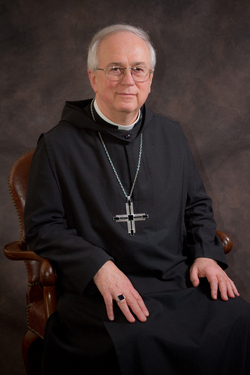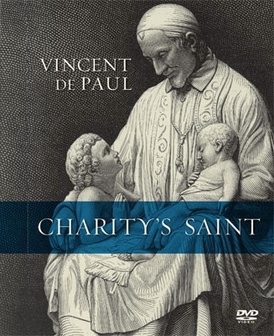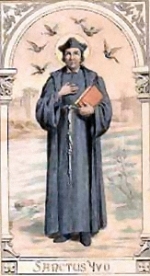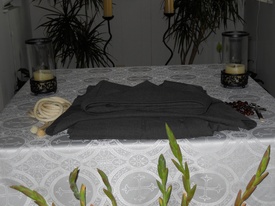 Yesterday morning (May 8) my friend Gabriel Scasino was invested in the habit of the Order of Friars Minor Conventual (OFMConv) at Saint Bonaventure Friary (Forestville, MD) during Lauds. His Minister Provincial, Father Justin Blase, presided at Lauds, blessed the habit, and then invested Gabriel with the Habit. Father Justin then celebrated the Holy Sacrifice of the Mass. Friar Gabriel belongs to the Immaculate Conception Province.
Yesterday morning (May 8) my friend Gabriel Scasino was invested in the habit of the Order of Friars Minor Conventual (OFMConv) at Saint Bonaventure Friary (Forestville, MD) during Lauds. His Minister Provincial, Father Justin Blase, presided at Lauds, blessed the habit, and then invested Gabriel with the Habit. Father Justin then celebrated the Holy Sacrifice of the Mass. Friar Gabriel belongs to the Immaculate Conception Province.
So you may ask, What is the habit all about? The habit is the religious garment of the person who takes the evangelical counsels (poverty, chastity, obedience). It is a sign (used here in the religious/philosophical sense) of something deeper than the person wearing the garment and it is a sign and symbol of Christ and the Church. As a point of comparison, diocesan priests would wear a cassock or a
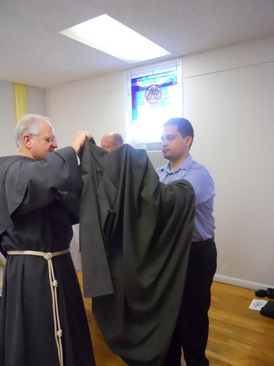
clerical shirt of some sort. Nevertheless, most religious orders of men and women have a habit, usually some stylized clothing of a former era, though some sisters and priests may wear secular clothing because the founder didn’t specify a habit because of the era in which the congregation was founded (e.g., Missionary Servants of the Most Blessed Trinity) or like Saint Ignatius of Loyola who told his disciples to dress as the respectable priests of the day. Orders like the Benedictines, Carmelites, Augustinians, Dominicans and the Franciscans have a habit to identify themselves as living as the poor: simple attire. The habit is a witness to someone greater than me; and believe it or not, the habit often opens more doors to Christ than one might realize because many people recognize a habit as a garment that expresses virtue.
The use of the habit may depend on the context in which the religious is living and working. In some cases color and type of fabric may be relative. However, what is clear is that the habit is not optional; it is not circus clothing, it is not for dress-up. The habit ought to help the person wearing it to take into account his or her life in Christ, preaching the Gospel and living the vows.
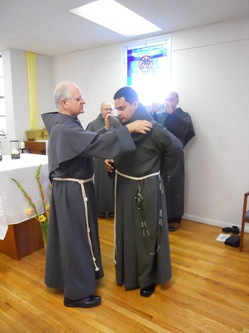
So, for my purposes here, let me quote from the Constitutions of the Order of Friars Minor Conventual we learn what the habit means for the Conventual Franciscan in relatively direct terms:
The religious habit of the friars, the sign of our consecration and of our community and a witness to poverty, must be simple and modest, poor and becoming. It consists of a black tunic with a capuche and a white cord. In certain places, for a reasonable cause approved by the Minister General with the consent of his definitory, the grey habit may be worn.
According to custom, it is laudable to wear –suspended from the cord– the Franciscan crown of the Blessed Virgin Mary.
The friars must wear the habit of the Order. The Minister General, however, for particular reason and as long as these last may permit another form of dress (97; emphasis mine).
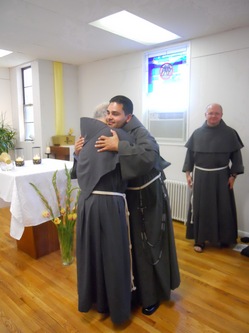
As you can see from these photos, Friar Gabriel and his conferes are wearing the grey habit, which the other Conventual provinces around the world are beginning to adopt as it is seen as the more authentic habit of the Conventual Franciscans.
Friar Gabriel Robert Scasino and I are from the same town, when to the same high school and our home parish is the same, though Gabriel is much younger than I am. He was a Conventual Franciscan for 7 years has been out for about 7 years and has been mercifully and graciously been re-admitted to the same.
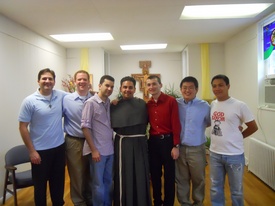
Beginning next week Friar Gabriel will spend 3 months in Assisi, Italy, doing a Franciscan course of study with the aim of putting him in touch with the Franciscan way of life by locating himself at the heart of Franciscan life.
Friar Gabriel will make a profession of temporary vows on the feast of Saint Joseph Cupertino, September 18.
May God grant Friar Gabriel many years as a Conventual Friar.
 The Spirit of the Lord has been given to me, for he has anointed me. He has sent me to bring good news to the poor, to proclaim liberty to captives and to the blind new sight, to free the downtrodden, and to proclaim the Lord’s year of favor.
The Spirit of the Lord has been given to me, for he has anointed me. He has sent me to bring good news to the poor, to proclaim liberty to captives and to the blind new sight, to free the downtrodden, and to proclaim the Lord’s year of favor.